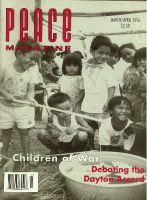
Peace Magazine Mar-Apr 1996, page 5. Some rights reserved.
Search for other articles by various here
I consider myself fortunate to be trading my blue beret for a helmet as I switch from U.N. to IFOR and head down to Central Bosnia. My former boss will stay on for a few months to "liquidate" the remains of the U.N. mission and I will stay until next summer, when I hope to go to teach at the Pearson Peace-keeping Centre. Until then I will be the liaison officer from the Canadian headquarters to the British division based in Gorni Vakuf. It will be a different perspective on things closer to the ground, and a chance to compare NATO and U.N. ways of doing business. So far the most remarkable thing is the imbalance between NATO's military planning and lack of preparation for the civil-military tasks which (in the defence of Europe) would otherwise be the responsibility of the host nation. Civil-military cooperation for such things as refugee movement, reconstruction, civilian policing and even mundane things like laundry contracts and building rental, is going to be a real challenge. The U.N. High Commission for Refugees is interpreting its mandate narrowly. They will not, for example, monitor local conditions to inform refugees when it is safe to return; they will only assist return when conditions are right. Similarly, each of the other agencies involved has carved out its piece of turf.
I am surprised perhaps naively so that it seems so disjointed between the military and civilian sides of the house. It creates an uncertain environment for anyone attempting confidence-building, reconstruction, development, and the like. Perhaps that will create opportunity for NGOs, but I would be more confident of a positive environment if it were well-organized, coordinated, and welcoming for third parties bringing the right assets. Perhaps that's just the bureaucrat in me.
I hope later (perhaps while I am at Cornwallis) to dissect the results of the last several months while I was working at the UNPROFOR headquarters in Zagreb. I still have not even thought carefully about all the things I have seen in the last six months. You know what they say about draining the swamp when you're up to your neck and there have been alligators.
Major David M. Last, Canadian Armed Forces Belleville, Ontario
A highlight at the Beijing conference was meeting Nguyen Ngoc Dung, one of the Vietnamese women who in 1969 came to meet Canadian and U.S. women. They could not go to the U.S. but American women came to Canada to learn about the war from them. At that time we first learned about the health and ecological impacts of napalm, Agent Orange, ecocide and biocide.
Dung now works with women and children as Executive Secretary of the Ho Chi Minh City Child Welfare Foundation. Many still suffer from the effects of the war and poverty. We can support them by contacting the Foundation at 55 Mac Dinh Chi, District 1, Ho Chi Minh City, Vietnam, tel (84-8)225137, Fax 228775.
Dorothy Goldin Rosenberg, Toronto
Carol Bright's "The Story of the International Red Cross" was informative and perceptive.. However, why does she (and why do the editors allow her to) continually refer to the Swiss founder of the ICRC as "Henry" Dunant, when his name is Henri? No self-respecting Swiss would anglicize his or her name, and no Canadian magazine should.
Campbell W. Robinson Waterloo, Ontario

Peace Magazine Mar-Apr 1996, page 5. Some rights reserved.
Search for other articles by various here